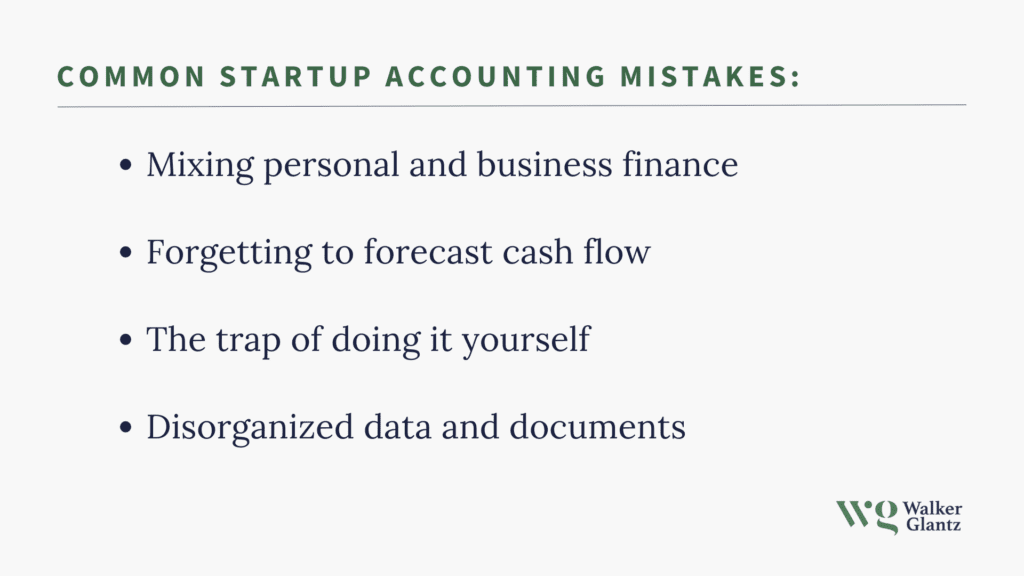Picture this: A promising tech startup is wrapping up their Series A pitch. The product is solid, the market fit is there, and the growth numbers are strong.
Then comes the due diligence.
What they discover stops everything in its tracks: months of messy books, missing documentation, and financial records that don’t match their pitch deck numbers. The round, and potentially the company’s future, hangs in the balance.
This scenario plays out more often than you’d think.
Another startup we know spent three years building groundbreaking AI-powered software, only to discover they’d missed out on hundreds of thousands in R&D tax credits. The reason? Poor documentation of their development expenses.
For founders, finances can feel like a distraction from the “real work” of building products and serving customers.
But here’s the truth: even groundbreaking tech and innovative solutions need solid financial foundations, and the earlier you build them, the better.
The early stage accounting challenge
The early days of a startup can be chaos.
You’re building your product, talking to potential customers and advisors, and trying to prove your concept. During this rush of activity, many founders create accounting challenges that can come back to haunt them later.
What starts as small oversights in bookkeeping can quickly balloon into significant financial and compliance risks.
Many founders face similar financial hurdles in these early stages. You’re moving fast, wearing multiple hats, and making quick decisions. Financial admin feels like it can wait.
But each passing month of neglected bookkeeping can compound the problem, creating a tangled web that becomes increasingly expensive – and time-consuming – to unravel.
The good news? These challenges are predictable and preventable. Understanding the most common financial pitfalls can help you avoid them from the start, and having the right financial guidance makes all the difference.
➡️ A common pitfall: Mixing personal and business finance
First, it’s important that you keep personal and business finance separate. Many founders start by funding their ventures personally, paying for early expenses from their own accounts.
While this can show dedication, it can also ultimately lead to a pile of intertwined transactions that become increasingly difficult to untangle as the business grows.
Beyond the administrative headache, mixed finances can also create tax complications and raise red flags during due diligence.
Opening separate business accounts from day one and maintaining clear boundaries between personal and business expenses saves countless hours of future cleanup and potential legal complications.
Not only that, but getting early guidance from a CPA who understands the startup world can help you establish clear financial boundaries and structure from day one – ultimately preventing costly cleanup and potential compliance issues down the road.
➡️ The hidden cost of poor record-keeping
Record-keeping can present a challenge in any company, but especially in fast-moving startups.
When you’re racing to meet demands and hit development milestones, keeping track of expenses often falls to the bottom of the priority list. Receipts get stuffed into drawers or scattered across email inboxes and expense apps.
But this disorganization makes it impossible to understand your true burn rate and can create a massive headache during tax season.
For tech companies, poor record-keeping has additional consequences. Missing documentation for development expenses can mean lost R&D tax credits. Unclear categorization of contractor payments can trigger compliance issues.
Having a financial advisor who understands your industry’s requirements can help ensure you’re capturing the right information and maximizing available benefits.
➡️ The cash flow challenge
Cash flow forecasting often gets overlooked in favor of revenue projections. Your revenue might look strong on paper, but poor cash flow can still sink your startup.
Understanding when money will actually hit your account is just as important as knowing how much is coming.
A strong cash flow strategy should account for:
- Expected customer payments and payment terms, including typical delays in enterprise client payments
- Regular expenses and payroll commitments, including contractor payments
- Upcoming investments or large purchases, like development infrastructure
- Emergency buffer for unexpected costs or project overruns
When you work with an experienced CPA, they can help you develop realistic forecasts and strategies to manage cash flow through different growth stages.
➡️ The trap of doing it yourself
We’ve seen a lot of founders initially try to handle their accounting themselves, applying the same DIY mindset that serves them well in product development.
But financial management requires different expertise! The DIY approach can lead to missed tax advantages and compliance risks that become expensive to fix later.
An example – many tech startups miss out on R&D tax credits or incorrectly calculate their development costs for tax purposes.
Others struggle with state nexus requirements as they grow, or miss crucial tax planning opportunities. These technical accounting requirements need expert guidance to navigate correctly.
➡️ When growth meets financial reality
Consider a typical growth-stage SaaS startup approaching their Series A.
Without proper financial oversight, their books become increasingly complex. Common issues can include:
- Uncategorized expenses scattered across multiple accounts and payment systems
- Missing documentation for major transactions and development costs
- Incorrect revenue recognition for different subscription tiers
- Inconsistent financial reporting that makes growth trends unclear
When potential investors request financial data, preparing it becomes a weeks-long scramble that distracts from running the business. And in worst case scenarios, poor financial records can delay or derail funding rounds entirely.
The power of strategic financial management
When appropriate systems are in place and companies prioritize strategic financial planning, board meetings focus on strategy instead of questioning numbers.
Unnecessary expenses become visible and controllable.
Tax preparation shifts from weeks of stress to a smooth process.
Future funding rounds move faster with clean financials ready for due diligence.
Take subscription billing, for example – a tricky part of SaaS accounting. Let’s say you bill a customer $12,000 for an annual subscription. While you might have the full payment in your bank account, you can’t count it all as revenue right away. You need to spread that $12,000 over the twelve months of service you’re providing.
This can get complex, fast. Maybe some customers pay monthly, others annually. Some might be on different pricing tiers, or have custom contracts.
Without proper guidance and oversight, you risk misreporting your revenue, which can lead to tax issues and raise red flags during due diligence. Many startups learn this the hard way during their first audit or due diligence process.
Having a CPA who understands these tech-specific accounting challenges can help you set up the right processes early, ensure compliance, and give you the financial clarity needed for strategic decisions.
Building for the future
Strong financial practices and expert guidance can give you the insights you need to make better business decisions.
And when you have clear financial data, you can understand your true unit economics, find opportunities for growth, and make confident decisions about hiring and expansion.
Working with the right financial partner can help you:
- Make data-driven decisions about growth and hiring based on accurate financial metrics
- Prepare confidently for investor due diligence with organized and compliant records
- Spot and fix issues before they become problems that impact growth
- Maximize available tax benefits and credits specific to tech companies
- Focus on building your business while knowing your finances are in expert hands
The key is in starting early. Building a relationship with an established, knowledgeable financial partner takes less time and money than fixing issues later.
Your future self – and your future business partners and investors – will thank you. But most importantly, you’ll have the financial clarity and guidance needed to make strategic decisions that drive your business forward.
Ready to get started? We’d love to learn more about what you’re building – reach out to us to learn more about how we can help you grow.







